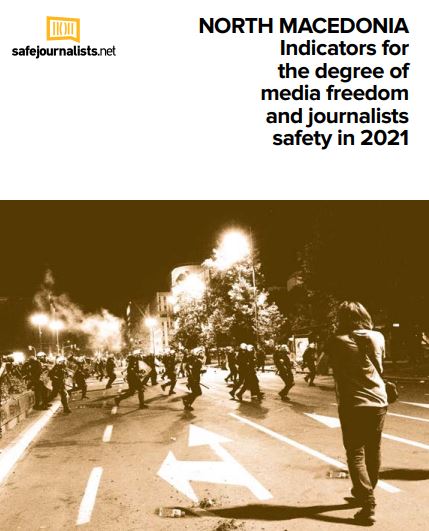
The Association of Journalists of Macedonia (AJM) presented the Annual Report on the Indicators on the level of media freedom and journalists’ safety in North Macedonia for 2021, prepared within the project Regional Platform for the Western Balkans, funded by the European Commission.
Associations of journalists from the Western Balkans, with the support of the European Commission, have set up a joint platform Safejournalists.net to monitor changes in their countries’ legislation and practice and to engage in various advocacy activities aimed at promoting political, legislative and the institutional environment in which journalists and the media operate. Since 2020, the members of the platform monitor the situation in seven countries (Albania, Bosnia and Herzegovina, Croatia, North Macedonia, Montenegro, Kosovo and Serbia). Each year, the assessment of the situation is based on standardized methods of data collection and analysis, while the focus of advocacy research is on changes in both, the traditional and online media environment in the Western Balkans. The research methodology consists of three sets of indicators developed based on a systematic analysis of various guidelines produced by relevant international organizations.
In the context of legal protection 2021, the Report states that a positive step was taken as the amendments to the Law on Civil Liability for Insult and Defamation and the Criminal Code were made. Almost all of AJM’s remarks on reducing the amount of compensation for non-pecuniary damage in the event of a journalist’s guilt and supplementing the parts for exclusion from liability for defamation and insult were accepted.
The amendments to the Criminal Code, initiated by AJM and the Journalists’ Union, incorporated the requirements for systematic protection of journalists and media workers, and the attack on a journalist and media worker would be treated as an attack on an official, which means that the BPPO will act ex officio, and penalties for assailants will be increased. The general assessment is that in 2021, the socio-economic position of journalists further deteriorated due to the pandemic, i.e., due to the reduction of advertising revenues in the entire media sector.
The employment status of many journalists, especially in the private media, is precarious, as journalists generally have fixed-term or part-time contracts, are not receiving pension and social security benefits, have low incomes, and other labour rights are not respected. As a result, journalists are much more vulnerable to pressure, both from management structures and from owners and politicians. In 2021, the number of attacks on journalists was reduced. Nevertheless, while the number of verbal and physical threats is declining, it is a worrying fact that journalists and media professionals are increasingly subject to threats and harassment on social media, some of which were serious threats to the physical safety of journalists investigating corruption and other negative social phenomena.
It is important to note that in December 2021 a court ruling was rendered in favour of the Association of Journalists of Macedonia (AJM) for an online threat to all journalists written on the AJM Facebook page. This is the first example of the Prosecution and the Court investigating and sanctioning a serious online threat to journalists.
However, despite the decrease in the number of attacks on journalists and media workers, impunity is still a big problem, because the competent institutions do not cooperate enough and rarely file charges against the perpetrators of threats or attacks, and in cases where investigations are initiated, they are slow and inefficient. Of particular concern is the hate speech and labelling of journalists and media workers by politicians and other public officials. In addition, the competent institutions and courts still do not keep sufficiently up-to-date records of threats and attacks on journalists, nor do they publish such data. However, it is positive that the competent institutions are open to cooperation with AJM and through joint consultations show readiness to work on improving the safety of journalists and media workers by taking more timely measures and prosecuting the perpetrators of attacks and threats.
In 2021, the number of attacks on journalists has decreased. In comparison, in 2020 AJM registered 14 attacks, and in the year before, AJM registered five. However, although the number of verbal and physical threats is declining, the fact that journalists and media professionals are increasingly subject to threats and harassment on social networks, some of which were serious threats to the physical safety of journalists working on corruption and other negative social phenomena.

This joint platform Safejournalists.net is a great example of the joint efforts and work of the Western Balkan countries. Such a similar example of cooperation has never been seen before in this region where in one place the journalists’ associations from the Western Balkans can follow the changes in their countries; legislation and practice and engage in various advocacy activities aimed at advancing the political, legislative and institutional environment in which journalists and the media operate.
It is important to note that each year; the assessment of the situation is conducted based on standardized methods of data collection and analysis, while the focus of advocacy research is on changes in both the traditional and online media environment in the Western Balkans. However, in addition to this report on security indicators, this platform last year conducted a systematic survey through a precisely defined methodology and developed a Safety Index for Journalists and Media Workers in the Western Balkans and this year is finalized the new Safety Index of journalists and media workers in the Western Balkans for 2021.
The Annual Report on the Indicators of the Level of Media Freedom and Safety of Journalists in North Macedonia, prepared within the project Regional Platform for the Western Balkans, funded by the European Commission, has been prepared, proofread and translated into Macedonian, Albanian and English language.
You can see the annual report on the following link